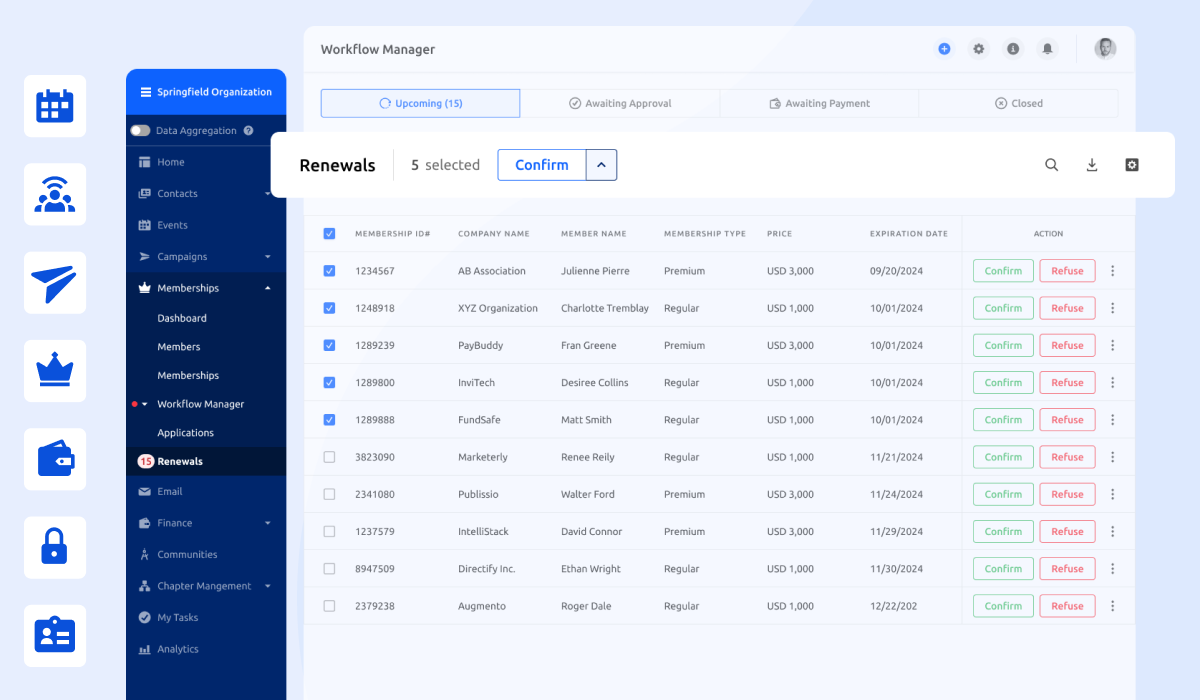
An organization without a membership chair is like a ship without a captain. If the captain is capable, they will sail the ship through storms and bad weather, safely guiding it to shore. The same goes for the membership chair.
They guide member engagement, recruitment, retention, and the overall membership experience, steering the organization toward growth while keeping members connected and engaged with leadership.
For the membership chair to be truly capable, they need to be fully aware of their responsibilities and duties. This guide is designed to help in this area. Read on to learn about the key responsibilities of a membership chair and how to make them more proactive and results-oriented than ever before.
Key Takeaways
- The membership chair ensures member recruitment, retention, and engagement, vital for organizational growth.
- The membership chair collaborates with various roles, such as marketing and event coordinators, to help them effectively fulfill their duties.
- Effective data management and reporting are key for informed decision-making and strategy planning.
- Addressing member inactivity, limited resources, and workload balancing through technology and automation ensures growth.
- Glue Up’s features automate tasks like member management, CRM, and invoicing, empowering the membership chair to focus on strategic goals.
Who Is Involved in Fulfilling the Duties of a Membership Chair?
Before discussing the specific responsibilities of the membership chair, it’s important to recognize the individuals within an association whose roles are essential in supporting this position:
- Membership Committee Members
- Marketing Manager
- Event Coordinator
- Data Analyst
- Administrative Assistant
- Finance Manager
- Executive Leadership Team
These individuals play a central role in enabling the membership chair to perform their duties effectively.
Key Responsibilities of a Membership Chair

The role of a membership chair goes beyond simply managing the membership list.
It involves creating and executing strategies to grow the organization, retain its members, and inspire an engaging community.
Below are the key responsibilities that define this critical role and confirm the organization's success.
Membership Recruitment
One of the membership chair's core responsibilities is developing effective strategies for attracting new members, understanding the organization's value proposition, and identifying potential member segments.
Meetings, which account for 34% of the recruitment channels that attract the most new members, play a key role in this process. Membership chairs are also instrumental in these meetings, i.e., engaging with potential members and converting them into regular, committed members.
In addition to analyzing trends and feedback, the membership chair tailors recruitment campaigns to appeal to target audiences, i.e., close collaboration with the marketing team and ensures that promotional efforts highlight the unique benefits of membership, such as networking opportunities, resources, and exclusive events.
Member Retention
Retention is equally important as recruitment. A membership chair guarantees that members continue to see value in their membership year after year.
The chair's role involves creating and overseeing initiatives that promote ongoing engagement, such as personalized member outreach, special offers, or recognition programs.
Stats suggest that only a 5% increase in customer retention can increase company revenue by 25-95%, and the same can be said for members. If the chair is proactive, it can facilitate this increase by focusing on retention strategies that directly impact both member satisfaction and organizational growth.
Member Engagement
Keeping members engaged is vital to the health of any organization. The membership chair leads efforts to create meaningful opportunities for members to participate in events, activities, and committees.
Their engagement initiatives cater to a diverse member base, such as organizing webinars and in-person networking events. The chair is also responsible for cultivating a sense of community among members by developing connections and encouraging peer collaboration.
Data Management and Reporting

Effective data management is another important role of a membership chair, as it allows for informed decision-making and strategic planning.
According to reports, 65% of organizations leverage data for competitive advantage. Therefore, the membership chair has a significant responsibility to monitor membership data and trends.
They must make certain that the organization continues to meet the needs of its members while providing valuable insights to the leadership team.
Tracking Membership Statistics and Growth
The membership chair is responsible for tracking membership statistics, such as total membership numbers, new member sign-ups, and member demographics.
This data helps the association to assess its current membership growth and identify any gaps or opportunities for future outreach.
However, consistently tracking this information provides a clear picture of membership trends over time, allowing for more strategic planning and effective goal setting.
Analyzing Engagement Metrics to Inform Decision-Making
Beyond raw membership numbers, engagement metrics are helpful for understanding how members are interacting with the organization.
The chair analyzes metrics such as event registration rates, newsletter open rates, and volunteer participation to measure overall member engagement.
This analysis is key to identifying which programs are working, where improvements are needed, and how to optimize future initiatives for member satisfaction.
The Impact of an Ineffective Membership Chair
An ineffective membership chair can have serious consequences for an association, leading to the following impacts:
- Decreased Membership Recruitment: Poor leadership can result in ineffective recruitment strategies, limiting the number of new members joining the association.
- Weak Onboarding Process: Without proper onboarding, new members may fail to engage or connect with the organization from the start.
- Higher Member Attrition: Neglecting current members can lead to feelings of being undervalued, resulting in higher member cancellations and lower retention rates.
- Reduced Member Engagement: Inconsistent communication and lack of engagement initiatives can leave members feeling disconnected from the organization’s mission and activities.
- Missed Insights and Feedback: Failing to track membership data or gather feedback can cause the organization to miss valuable insights needed to improve the member experience.
- Poor Communication with Leadership: Ineffective communication between members and leadership can leave issues unresolved and lead to dissatisfaction, hindering growth opportunities.
- Negative Impact on Growth and Financial Health: Over time, poor recruitment and retention can damage the association’s overall growth and financial stability.
These points highlight how essential an effective membership chair is to maintain the health and growth of an association.
Best Practices for a Successful Membership Chair

To excel as a membership chair, it is important to adopt best practices that authorize effective communication, relationship building, and continuous improvement.
These practices, such as the following, enhance the membership experience and contribute to the long-term success of the organization.
Effective Communication
The membership chair should be proactive about contacting members regularly through emails, newsletters, or meetings to keep them informed about upcoming events, new initiatives, and any changes within the association.
The chair acts as a mediator between the members and the leadership, ensuring that member concerns, feedback, and suggestions are conveyed and addressed promptly.
Relationship Building
The membership chair has to actively engage with members so they can build relationships and regularly connect with them to understand their needs and expectations.
Relationship building can include one-on-one conversations, networking events, or surveys. Moreover, networking with potential members and key stakeholders to expand the organization's reach and influence will help in the long run.
Continuous Learning and Improvement
To remain effective, the chair must stay informed about industry trends and emerging best practices in membership management.
Keeping up with new tools, strategies, and technologies helps membership chairs big times and lets them continuously improve the organization's membership processes.
Also, regularly reviewing member feedback and engagement data works in their favor. It helps identify areas for improvement and allows for refining the membership experience.
Common Challenges and How to Overcome Them
Even the most dedicated membership chairs encounter challenges that can disturb membership growth and engagement.
However, these common obstacles can be proactively addressed if the membership chair maintains strong relationships with members and applies the following strategies.
Member Inactivity
One of the most significant challenges is member inactivity, where members become disengaged or inactive.
To reengage disinterested members, personalized outreach strategies that target specific needs or interests are important. Offering tailored events, exclusive content, or new membership benefits can reignite interest.
Additionally, conducting surveys to gather feedback on what members value or would like to see improved can help guide more effective engagement efforts. Then, address the root causes of inactivity, make members feel valuable again, and rekindle enthusiasm and involvement.
Limited Resources
Managing membership growth with limited time and budget is a common challenge. To overcome this, the chair must benefit from technology and should automate routine tasks.
As Michael Heart says, "Automation is solving the problem once and then putting it on autopilot." By automating repetitive tasks, the membership chair can focus on strategic initiatives that drive growth and engagement.
Using membership management software to streamline processes like renewals, invoicing, and event registration will free up time for more strategic initiatives. One such MMS is Glue Up, which automatically manages renewals, engagement history, and member lists while providing advanced search functions. To learn more about how this membership management solution can help you, book a demo.
Additionally, collaborating with volunteers or forming small committees will also help distribute the workload without straining resources.
Balancing Responsibilities
The role of a membership chair requires wearing many hats, from recruitment to engagement to reporting. Time management and prioritization are key to effectively balancing these responsibilities.
Breaking down tasks into manageable parts and creating a clear schedule or calendar can confirm that every area is addressed. Additionally, delegation can be a powerful tool, whether it’s assigning certain tasks to team members or leveraging automation tools.
Sharing the workload allows the chair to focus on strategic efforts. Regularly assessing priorities and being adaptable in adjusting plans can also help keep everything running smoothly.
Maximize the Effectiveness of Your Membership Chair with Glue Up

In addition to following best practices, one of the most effective ways to enhance the performance of your membership chair is to use membership management software.
Glue Up offers a range of features designed to help associations streamline and automate their processes.
Let’s examine how Glue Up’s features can support the work of a membership chair.
Membership & Event Management
Manage your members, events, and registrations seamlessly in one place. Track attendance and engagement to certify your members get the most value from your events.
CRM
With a built-in CRM, you can keep track of all your members' interactions, preferences, and history to personalize your outreach and improve member engagement.
Email Campaigns
Easily create and send targeted email campaigns to your members, ensuring they stay informed about upcoming events, news, and other important updates.
Invoicing & Payments (Auto-generated Invoices)
Generate invoices automatically and manage payments efficiently, reducing the manual workload for your membership team.
Community Building
Facilitate member-to-member connections with an integrated community platform, encouraging networking and collaboration within your organization.
Mobile Apps
Allow your members to access your events, communications, and resources on the go with mobile apps that provide a seamless experience.
Automatic Reminders
Set up automatic reminders for renewals, payments, and upcoming events to keep your members informed without the need for manual follow-ups.
Customizable Dashboard
Get a real-time overview of your membership metrics, events, and engagement with a customizable dashboard that offers insights tailored to your needs.
AI Copilot
Utilize AI Copilot to help create emails, event descriptions, surveys, and other content, making it easier to tailor communications to your members' needs.
If you'd like to explore how Glue Up can support your membership management, request a demo.


